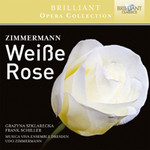|
Back
12/28/2015
Udo Zimmermann: Weisse Rose
Grazyna Szklarecka (Sophie Scholl), Frank Schiller (Hans Scholl), Musica Viva Ensemble Dresden
Recording: Studio Lukaskirche, Dresden, Germany (May 1988) – 68’37
Brilliant Classics #95125 – Booklet in English and German

   
As heinous the crimes committed by Hitler and his Nazi regime were, it’s through Udo Zimmermann’s music that one’s complacency is jogged in order to fathom unfolding tragedies via two pairs of eyes, resistance siblings Sophie and Hans Scholl. Udo Zimmermann’s suitably titled Weisse Rose is just that: it represents symbolism of purity and truth. Revealing and daring an approach, this mélange of Scholls’ written etchings unwraps abruptly and with a startling message: abusive power wreaks havoc amongst the innocent and the stigmatized. Zimmermann is unsparing in fussiness.
The one act chamber opera, originally written by Zimmermann’s brother, Ingo, opened in 1967, but was later revised and premiered in 1986. The pithy manuscript by Wolfgang Willaschek outlines a sharply delineated timeline leading to Scholls’ execution. It teems with abstract elements and is intermittently interspersed with moments of bona fide realism. Despite Zimmermann’s music being dissonant and jarring on the surface, Weisse Rose actually contains a couple of clandestine melodic motifs, well expressed by the Dresden Musica Viva Ensemble’s 16 members.
Grazyna Szklarecka’s pristine soprano voice tackles Zimmermann’s difficult notes which he wrote for an unusually high tessitura and its hard-to-reach jumps and drops. Breath control is imperative, and Szklarecka handles this with care and detail: Sophie’s diction poignantly comes to life.
On the other hand, the tenor reaches by Frank Schiller are more evened. Schiller’s delivery is clear and ‘in the present.’ This helps explain two differing azimuths: an idealistic Sophie versus Hans’ humanistic stances.
The structure is a back-and-forth dialogue between Szklarecka and Schiller, mini-vignettes of sorts. Zimmerman’s stridencies reminisce of Viktor Ullmann or Alexander Zemlinsky. Likewise, his use of secco chording adeptly harkens back to classical Bach.
Though the Willaschek writing is downloadable via Brilliant Classics’ website, it is only available in German. To understand the music is to understand the libretto. It is the only way a listener can comprehend Weisse Rose in toto. Disappointingly, Brilliant Classics overlooks English translation for the score sends too powerful a message. With frustration, this reviewer cobbled together a meaning with disjointed outcome.
Weisse Rose takes the listener into a musical abyss quickly and unhesitatingly. As a whole, the work deserves greater attention due to its universal message beyond.
Christie Grimstad
|